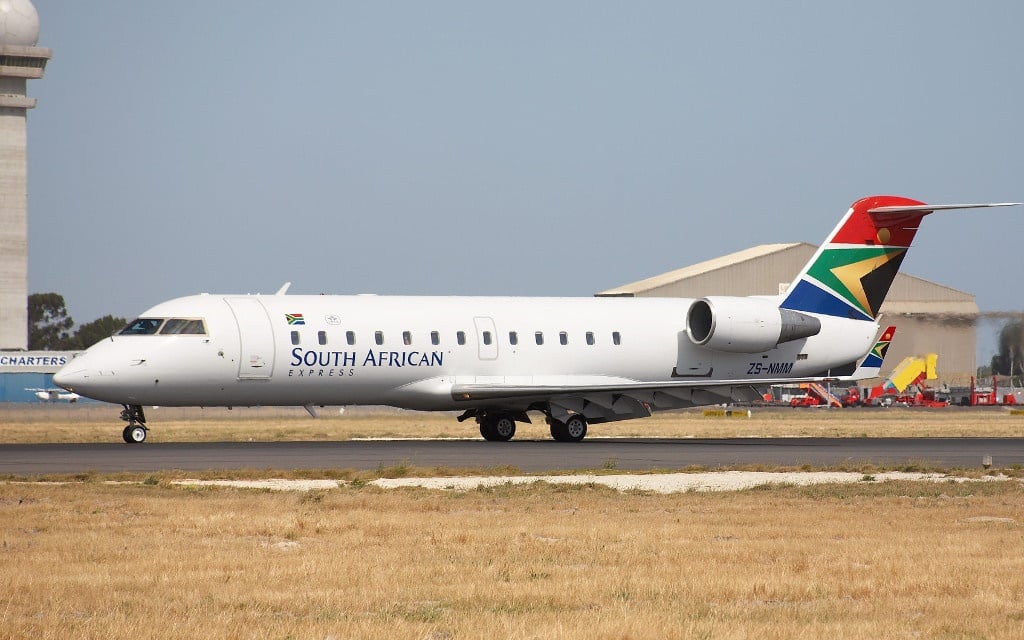
- Letting the state-owned airline fail would remove "the heart of transformation in the airline industry", a co-pilot writes to President Cyril Ramaphosa.
- Pilot training can cost between R700 000 and R1 million, making it impossible for most to afford.
- SAX has been placed in provisional liquidation after its business rescue rescue practitioners and the Department of Public Enterprises were unable to agree on a rescue plan.
Liquidating SA Express (SAX) would remove "the heart of transformation in the airline industry", a first officer at the airline has written in an open letter to President Cyril Ramaphosa.
The state-owned regional airline has been placed in provisional liquidation after its business rescue rescue practitioners and the Department of Public Enterprises were unable to agree on a rescue plan. The airline stopped paying salaries from February.
Lebogang Matlala wrote to Ramaphosa to say liquidating SAX would be a blow to transformation in South Africa's airline industry. A first officer ranks below a captain on an airplane, and is sometimes referred to as a co-pilot.
Matlala said SA Express was currently the only airline in the country that accepted newly qualified commercial pilots with 200 hours flying time to fly for the airline as part of its cadet pilot programme.
"To this day, when a pilot moves from SA Express to other airlines, training captains receive calls to compliment then on the quality and standard of those individuals," Matlala writes.
Training costs
Pilot training can cost between R700 000 and R1 million, making it impossible for most to afford.
"Of course, we have to be of high standards because we have to constantly prove that we belong here, because any sign of weakness will reflect on the programme as a whole," writes Matlala.
So far, around 80 pilots from previously disadvantaged groups had come up the ranks through SA Express, he said.
He points out that, according to statistics provided by the SA Civil Aviation Authority in its 2018/2019 annual report, 348 people from previously disadvantaged groups held commercial pilot licences, compared to 2 772 white people.
"The little transformation that has been achieved has primarily been achieved through SA Express. It is important to note that, without SA Express, the numbers we see at SAA and Mango would have not been possible, simply because SA Express is and has been the feeder of experienced pilots for other companies.
"SA Express was once one of the most respected company in aviation and was the fastest growing regional airline in Africa and cost the taxpayer nothing, but actually yielded profits. It was mismanagement and poor governance that dimmed the light of this thriving business."
In his letter, Matlala said it was not simply about wanting government, via taxpayers, to provide money to revive the airline, simply because it drives transformation. He merely wanted his letter to show why SA Express was so crucial and why it should be regarded – and celebrated – as a national asset.
Provisional liquidation
According to the provisional liquidator of SA Express, Aviwe Ndyamara of the Tshwane Trust Company, there is certainly an opportunity within the liquidation proceedings for restarting operations. This would be where the liquidators enter into a compromise with the body of creditors.
"That, of course, would require an investor to enable the liquidators to be in a position to negotiate a compromise," said Ndyamara.
Earlier this week, Ndyamara briefed Parliament and indicated that seven "interested parties" had expressed an interest in the airline.
The National Union of Metalworkers of South Africa and the South African Cabin Crew Association recently announced that they had an investor from the United Arab Emirates potentially interested in buying a stake in SA Express.
South African law prohibits a stake larger than 25% in foreign ownership in a domestic airline.